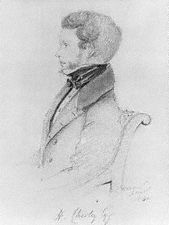Henry Chorley

Henry Fothergill Chorley (15 December 1808 – 16 February 1872) was an English literary, art and music critic, writer and editor. He was also an author of novels, drama, poetry and lyrics.
Chorley was a prolific and important music and literary critic and music gossip columnist of the mid-nineteenth century and wrote extensively about music in London and in Europe. His opera libretti and works of fiction were far less successful. He is perhaps best remembered today for his lyrics to "The Long Day Closes", a part song set by Arthur Sullivan in 1868.
Life and career
Chorley was born in Blackley Hurst, near
Journalism and non-fiction works
He began working in merchants' offices, hoping to become a musician, but his uncle discouraged that as an impractical ambition. However, Chorley soon took to musical and literary criticism. He began to write for the
In addition to criticism for journals, Chorley wrote voluminously on literature and art. His non-fiction books were widely read and included Music and Manners in France and Germany (1841), which includes a detailed description of contemporary opera in Paris and
Fiction and playwriting
Chorley also wrote, with far less success, novels, stories, drama and verse, and various


Chorley wrote the English libretto for Gounod's
Personality and last years
Chorley was considered eccentric and abrasive, but he was respected for his integrity and kindness. Chorley enthusiastically gave and attended dinner parties and was known as a big drinker. He cultivated friendships with Elizabeth Barrett Browning and Mendelssohn, and later Charles Dickens, Arthur Sullivan and Charles Santley, among others. After the death of his brother, John Rutter Chorley (1806–1867), he inherited enough money to retire from the Athenaeum, although he continued to contribute articles for that paper and also for The Orchestra.
In spite of his efforts to promote the music of Charles Gounod in England, the composer disliked Chorley intensely. When Gounod lived in England during the early 1870s, he wrote a satirical character piece for piano that was intended to be a parody of Chorley's personality. It greatly amused Gounod's English patron, Georgina Weldon, who described Chorley as having a "thin, sour, high-pitched sopranish voice" and moving like a "stuffed red-haired monkey."[11] Gounod intended to publish the piece with a dedication to Chorley, but the latter died before this was possible. Weldon then invented a new programme for the piece, which was re-titled Funeral March of a Marionette. It became popular as a concert piece,[12] and in the 1950s, its opening phrases became well known as the theme music for the television program Alfred Hitchcock Presents.[13]
Chorley died at his home in London in 1872, at the age of 63, and is buried there in Brompton Cemetery.[14] He left a very considerable estate of £45,000.[1] Fellow critic Charles Lewis Gruneisen wrote in the Athenaeum that Chorley's personality had impeded appreciation of his qualities.[1]
Notes
- ^
- ^ See Preface by Robin Gordon-Powell, Archivist & Music Librarian of the Sir Arthur Sullivan Society, to the score of The Masque at Kenilworth, published by The Amber Ring in 2002
- ^ "Modern German Music – Recollections and Criticisms", The Times review, 25 April 1854, p. 8, col. B
- ^ "Henry Fothergill Chorley", The Brownings' Correspondence, accessed 30 October 2022
- ^ "Birmingham Musical Festival", The Times review, 12 September 1864, p. 10, col. A
- ^ Songs with English lyrics by Chorley
- ^ C. Pearce, Sims Reeves – Fifty Years of Music in England (Stanley Paul, London 1924), pp. 241–42.
- ^ Translations of Gounod songs by Chorley
- ^ Aldrich, Richard. "Of Music and Musicians: Hugo Wolff, His Songs and His Admirers—Mendelssohn's 'Return of the Roamer' and Its Origin," The New York Times, 22 November 1903, accessed 23 November 2009
- ^ Programme notes for Concert Opera Boston performance of 15 March 2009, accessed 23 November 2009
- ^ Harding, pp. 179–80
- ^ Hale, Philip. Programme, Boston Symphony Orchestra
- ^ Frankel, Chris. "Jacopo Pontormo Tournament of Manners", #9 Archived 15 June 2011 at the Wayback Machine, 1 July 2005
- ^ The Times, 21 February 1872, p. 5, col. E
References
- Harding, James. Gounod, New York: Stein and Day (1973)
Bibliography
- Chorley, Henry Fothergill. (1862). Thirty Years' Musical Recollections. Hurst and Blackett (reissued by ISBN 978-1-108-00139-7)
- Chorley, Henry Fothergill. (1841). Music and Manners in France and Germany. Longmans, Orme, Brown, Green and Longmans (reissued by ISBN 978-1-108-00203-5)
- Chorley, Henry Fothergill. (1854). Modern German Music. Smith, Elder (reissued by ISBN 978-1-108-00158-8)
- Chorley, Henry Fothergill. (1880, posthumously published). The National Music of the World. Low, Marston (reissued by ISBN 978-1-108-00138-0)
- Chorley, Henry Fothergill. Autobiography, Memoir and Letters, edited by H. G. Hewlett, 2 vols. (1873).
- Chorley, Henry Fothergill. Thirty Years' Musical Recollections (Hurst and Blackett, 1862). Available online here
Further reading
- Bledsoe, Robert Terrell, Henry Fothergill Chorley: Victorian Journalist. Aldershot: Ashgate, 1998. ISBN 978-1-84014-257-0
- Bledsoe, Robert Terrell. "Henry Fothergill Chorley and the Receptions of Verdi's Early Operas in England"], Victorian Studies, Summer 85, Vol. 28, Issue 4, p. 631
- Lehmann, R. C. Memories of half a century (1908)
- Marchand, L. A. The Athenaeum: a mirror of Victorian culture (1941)
- Sanders, V. (ed.) Martineau, Harriet: selected letters (1990)
External links
- Chisholm, Hugh, ed. (1911). . Encyclopædia Britannica. Vol. 6 (11th ed.). Cambridge University Press. p. 270.
- Portrait of Chorley in the National Portrait Gallery, London
- A literary review piece by Chorley
- Old Love and New Fortune, a play by Chorley
- Lyrics and translations by Chorley on IMSLP.ORG.
